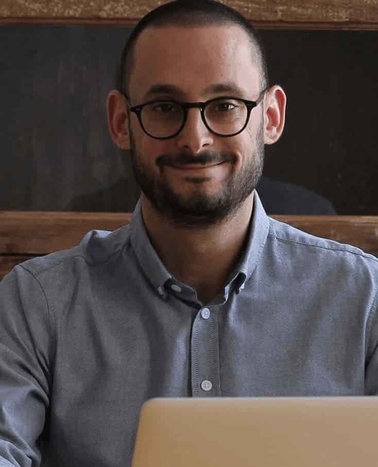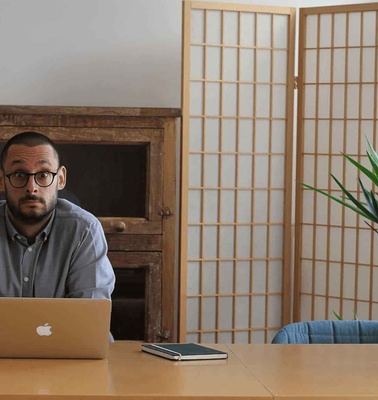
Nadim Choucair
Nadim Choucair is a Lebanese-Canadian entrepreneur. He studied the International MBA at IE and has a background in Mechanical Engineering, Business & Diplomacy. Currently, he is living in Berlin, where he works building partnerships with relevant ecosystem stakeholders to help achieve the UN's SDGs with his start-up, 2030 Cabinet.

"Be sure to open your mind, because we need multidisciplinary approaches and skills to solve big challenges."
WHAT IS SUSTAINABLE DEVELOPMENT FOR YOU? WHY IS IT SO IMPORTANT?
Thanks to my experience at IE Business School I came into contact with other schools at IE University, such us IE School of Global and Public Affairs, where I gave a class in mid-January to students from the Masters in International Development, and I invited them to unpack the definition of Sustainable Development. The Brundtland Report defines sustainable development as “development that meets the needs of the present without compromising the ability of future generations to meet their own needs.” It’s practically a Human Centered definition of Sustainable Development, and this is precisely where the problem lies. Humans are notoriously bad at predicting the future, so why are we even claiming that we can foresee what the needs of future generations are? And how can we judge whether or not we are compromising those needs? The human aspect of the definition made its application subject to short termism. I prefer another definition by John Ernfeld in his book “Sustainability by Design”: Sustainability is the possibility that humans and all other life flourish on the earth forever.
As for the why, I’ve yet to hear or see someone answer that better than Hans Rosling in his TEDxCannes speech in 2010. But it’s a new decade, right? Well switch on any news outlet and we quickly understand that we’re not on the right track and the question is not whether sustainable development is important, it’s whether the current economic development model is viable.
WHEN AND WHY DID YOU DECIDE TO FOCUS YOUR CAREER ON SUSTAINABLE DEVELOPMENT?
My introduction to design thinking happened at the IE Net Impact Club’s Social Responsibility Forum, applied to a Hult Prize challenge. Professor Andrew McCarthy was facilitating this workshop, which is an undetachable part of how my journey started. It was his energy, combined with the effectiveness of the methods, that planted the seed in my mind that later led me to combine the SDGs and Design Thinking. I learned about the severity of climate change in 2016 through the lens of the Arctic and the melting ice cap during a “Science Diplomacy in the Arctic” course at the Fletcher School of Law & Diplomacy, second part in my dual degree after IE Business School. Wanting to understand how I can make a difference, I then took the “Sustainable Development Diplomacy” course and learned about the Sustainable Development Goals. I was convinced that with some of my learnings from IE about lean approaches to innovation & design methods, we can do more for sustainable development at the intersection of the private and public sector. So I started thinking about how the SDGs can be a source of innovation for businesses, and how businesses can help achieve those goals.
TO WHAT EXTENT DID IE HELP YOU TO GO THAT WAY?
I was a Venture Network fellow at IE’s Area 31, helping attract & select startups to pitch and engage with Madrid’s larger startup ecosystem to build relations that would help IE Business School. This is the job I continued doing in Berlin after graduating, and now I founded my own business to continue to do it but with a different focus, accelerating progress towards the SDGs through partnerships & ecosystem building.
YOU WORK AT 2030 CABINET. HOW DOES YOUR COMPANY HELP ACHIEVE THE 2030 AGENDA?
I started 2030 Cabinet with this mission to accelerate progress towards the SDGs. The SDGs are a common language that can bring relevant stakeholders together to solve the challenges we are facing. We use that, and create formats and forums to help those stakeholders to take action. In short, we help them become partnership ready.
One example of engaging formats and methodologies rooted in design practice is the Global Goals Jam. Through similar formats, we engage with representatives of what I call the SDG ecosystem entrepreneurs, international organizations, policymakers, academics, local and national governments, and investors. We actively try to build that ecosystem in Berlin as a start.
IN YOUR OPINION, WHICH HAVE BEEN THE MAIN OBSTACLES AND MISTAKES AT AN INTERNATIONAL LEVEL TO HELP ACHIEVE THE SDGS?
I can only speak from my experience but I found that awareness around the SDGs is still too low and slow. 2019 saw a remarkable increase, which is encouraging, but that’s four years in, and awareness is the first step leading to action. But my experience is limited, and lack of awareness is part of a bigger problem. The bottom line is that policy making has not been as bold, and a larger system change is needed. We must find alternative ways to finance the 2030 Agenda & counter the potential short term negative economic effects that are holding back many of the policies needed, while we try to push towards long-termist approaches.
WHEN THE 2030 AGENDA WAS ADOPTED IN 2015 IT WAS CONSIDERED RADICAL AND INCLUSIVE. WHY DO YOU THINK THAT WAS AND HOW HAS PERCEPTION CHANGED SINCE THEN?
During the last two years the perception or conversation around sustainability converged towards climate action. There is more awareness around the need for radical solutions, with activism like Fridays For Future or Extinction Rebellion. what’s interesting about the 2030 Agenda is that you can drive your own sub agenda and argue what that goal is important, because at the end of the day all the goals are interconnected and are needed for a more sustainable world, and one just needs to take ownership. What is true is that agenda’s “inclusiveness” is not always applicable in practice, especially in the business world. I’ve noticed that conversations around the SDGs very quickly move into people trying to tell you how their work contributes to them. nce you ask them the challenges they face in working towards the SDGs, they realize they all have the same ones: Where do we start, what do we need to invest, what do we need to give up, how do we measure, who do we impact and how can we make their lives better. And then when they understand it as a system and when they start seeing the possibility and necessity of being more inclusive, they understand the need, and the advantages of collaboration & partnerships.
YOU HAVE LIVED IN BEIRUT, MONTREAL, MADRID, BOSTON AND NOW BERLIN. ARE YOU IN THE RIGHT PLACE TO BE?
As the capital of Europe’s largest economy, Berlin is a great place to work on the 2030 Agenda. It’s also a very conscious city in terms of environmental and social impact. It is also amazing because of its startup ecosystem, there is a lot of creativity and big potential to create change. It’s also an interesting challenge: while awareness in Berlin about such topics is high, it’s met with the reality of business powerhouses in the rest of Germany, built on the old economic model. They are the backbone of the German economy, and change is slower than what it needs to be.
WHAT GIVES YOU HOPE?
The upcoming generation has a complete new lens on the world. We and the older generation may be most interested in what we will lose, everything related to our current lifestyle. But younger people know they will lose their futures if things don’t change. This new generation is better informed, has taken on the responsibility to deliver the message that business as usual won’t work. These are the business leaders, policy makers, mayors and ministers of the future.
HOW WOULD YOU DESCRIBE YOUR CAREER PATH?
I was working in innovation consulting before going for graduate studies and my work involved being at the intersection of the private and public sector to enable SMEs to innovate. I also always had an interest in international relations, so I decided to combine a business degree at an entrepreneurially minded institution, which led me to the dual degree at IE Business School & The Fletcher School of Law & Diplomacy. It was the best decision I could have made and my questions soon became: How can entrepreneurship help achieve the SDGs? What sort of ecosystems & partnerships do we need? And that’s what I am currently working on.
WHAT WOULD YOU SAY TO A STUDENT WHO IS CONSIDERING A DEGREE IN BUSINESS OR IN INTERNATIONAL DEVELOPMENT? WHY PURSUE IT?
I think this is a great time to do it. A lot of talent is needed on our journey towards 2030. The international development community is reinvigorated by the SDGs. There is no better moment to equip yourself with the knowledge and tools to drive that message home, that we must act. But be sure to open your mind, because we need multidisciplinary approaches and skills to solve these big challenges. Be sure to understand the complex system we operate in, and find your way to reduce that complexity so that you can impact others through your work, and bring people on board to help you.